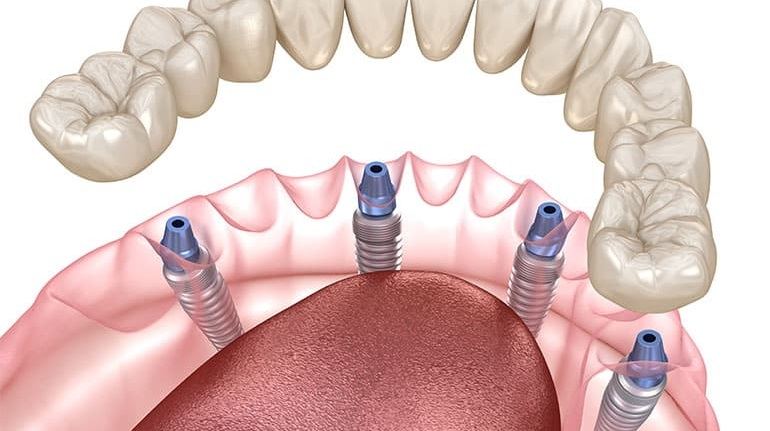Dental implants have revolutionized modern dentistry by offering a durable and natural-looking solution to replace missing teeth. For individuals with diabetes, however, concerns about the safety and success of dental implants may arise due to the systemic effects of diabetes on oral health and healing processes. This article explores the intersection of diabetes and dental implants, addressing common questions, risks, considerations, and advancements in implant dentistry for diabetic patients.
Understanding Diabetes and Oral Health
Diabetes mellitus, commonly referred to as diabetes, is a chronic condition that affects how the body metabolizes glucose (sugar), leading to elevated blood sugar levels. Type 1 diabetes is characterized by the inability of the pancreas to produce insulin, while Type 2 diabetes involves insulin resistance and inadequate insulin production.
Diabetes can impact oral health in several ways:
Gum Disease (Periodontitis): Diabetes increases the risk of gum disease due to elevated blood sugar levels fostering bacterial growth and reducing the body’s ability to fight infections. Gum disease, if left untreated, can lead to tooth loss and compromise the success of dental implants.
Delayed Healing: Individuals with diabetes may experience impaired wound healing, including in the oral cavity. This can affect the integration of dental implants with the jawbone and increase the risk of complications post-surgery.
Dry Mouth (Xerostomia): Diabetes and certain medications used to manage diabetes can cause dry mouth, which reduces saliva production. Saliva plays a crucial role in oral health by neutralizing acids, washing away food particles, and preventing bacterial growth. Dry mouth can contribute to tooth decay and gum disease, affecting the longevity of dental implants.
SEE ALSO: How Much Do Dental Implants Cost at Most?
Are Dental Implants Suitable for Diabetics?
Despite the challenges posed by diabetes, dental implants remain a viable treatment option for many diabetic patients. The decision to proceed with dental implants should be based on a thorough assessment by a dental professional, taking into account the individual’s overall health status, diabetes control, and oral hygiene habits.
Key Considerations for Diabetics Considering Dental Implants:
Diabetes Control: Well-controlled blood sugar levels significantly improve the outcomes of dental implant surgery.
Patients with diabetes should work closely with their healthcare team to manage their diabetes effectively before undergoing implant placement.
Oral Health: Good oral hygiene practices, including regular brushing, flossing, and professional dental cleanings, are essential for diabetic patients considering dental implants. Treating any existing gum disease or dental infections before implant surgery reduces the risk of complications.
Medical Evaluation: Prior to implant surgery, diabetic patients may undergo a comprehensive medical evaluation to assess their overall health, evaluate diabetes management, and identify any conditions that could affect healing.
Consultation with Specialists: Collaboration between the dentist, oral surgeon, and endocrinologist (diabetes specialist) may be beneficial to optimize treatment planning and ensure comprehensive care for diabetic patients undergoing dental implant placement.
Advancements in Implant Dentistry for Diabetics
The field of implant dentistry continues to evolve, with advancements aimed at improving outcomes for patients with systemic conditions such as diabetes. Some of the notable advancements include:
Guided Implant Surgery: Utilizing advanced imaging techniques such as cone beam computed tomography (CBCT) allows for precise planning of implant placement, minimizing surgical risks and optimizing implant success rates in diabetic patients.
Surface Modifications: Innovations in implant surface technology, such as bioactive coatings and textured surfaces, promote faster osseointegration (fusion with the bone) and enhance stability, particularly beneficial for diabetic patients with compromised healing capabilities.
Immediate Implant Placement: In select cases, immediate implant placement after tooth extraction may be feasible for diabetic patients, reducing the overall treatment timeline and enhancing patient satisfaction.
Regenerative Techniques: Emerging regenerative therapies, such as growth factors and bone grafting materials, support bone regeneration around dental implants, addressing bone loss concerns common in diabetic patients.
Managing Risks And Enhancing Success
To mitigate potential risks associated with dental implants in diabetic patients, comprehensive pre-operative planning and meticulous post-operative care are crucial:
Pre-operative Planning: Assessing diabetes control, conducting thorough oral examinations, and addressing any existing oral health issues are essential steps before implant placement. Optimizing blood sugar levels and overall health can improve surgical outcomes.
Post-operative Care: Following implant surgery, diabetic patients should adhere to post-operative instructions provided by their dental team. This includes maintaining good oral hygiene, attending follow-up appointments, and monitoring for signs of infection or implant complications.
Monitoring and Maintenance: Regular dental visits for professional cleanings and routine examinations are essential for monitoring the health and stability of dental implants in diabetic patients. Early detection of any issues allows for prompt intervention and preservation of implant function.
Conclusion
While diabetes presents challenges for oral health and healing processes, dental implants remain a safe and effective treatment option for many diabetic patients seeking to restore their smile and oral function. With advancements in implant dentistry, personalized treatment planning, and diligent management of diabetes, dental professionals can help diabetic patients achieve successful outcomes with dental implants. Collaboration between patients, dentists, and healthcare providers is key to optimizing oral health and quality of life for diabetic individuals considering dental implant treatment.

